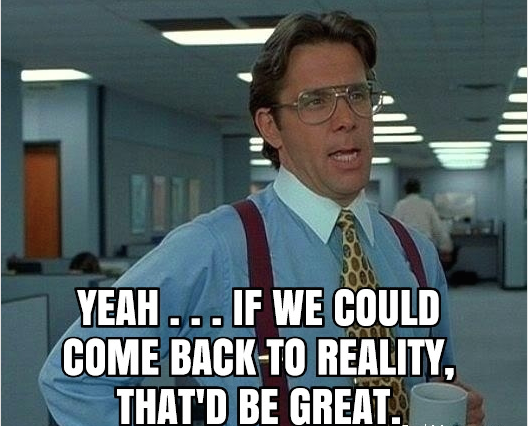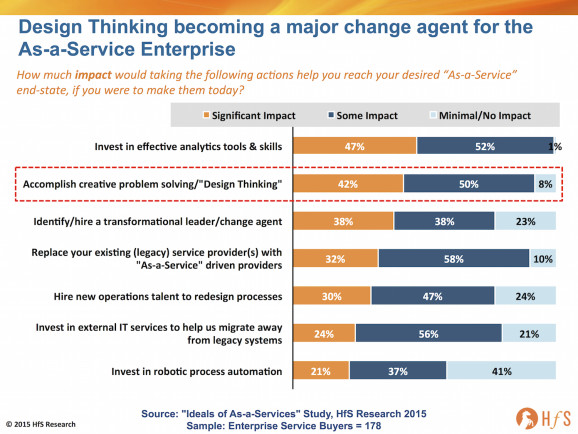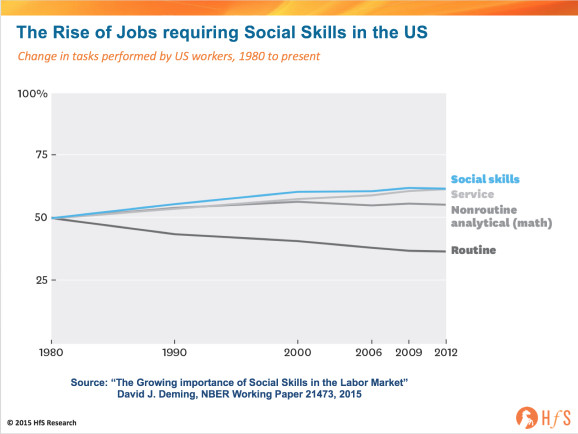 Automation hype and anxiety is everywhere today. In fact, haven’t you been amazed by the emergence of all these “automation experts” that have suddenly appeared on your LinkedIn recently? It’s as if these people went to school 20 years ago with the sole purpose of becoming an automation expert…
Automation hype and anxiety is everywhere today. In fact, haven’t you been amazed by the emergence of all these “automation experts” that have suddenly appeared on your LinkedIn recently? It’s as if these people went to school 20 years ago with the sole purpose of becoming an automation expert…
However, I have good news for the paranoid – computers are still really bad at simulating social interaction. What’s more, team work is becoming more critical than ever, as we need to keep adapting to a changing work environment. Your personality and ability to excite, befriend, intellectually stimulate, or just have a laugh with the people around you, is now more critical than ever.
Welcome to the socially-intelligent workforce, where your reputation is everything
What’s more, there is nowhere to hide anymore – if you repeatedly behave badly, back-stab, lie, or are just an asshole to work with, your reputation will spread across the digital and social networks, like it never did in the past. When smart future employers check you out, it’s so easy to find former colleagues to conduct informal background checks. There is no hiding anymore, so prepare yourself for the socially intelligent workforce, or scramble for one of those fast-disappearing legacy jobs, where you can hide away for years, unnoticed by the world.
Your ability to interact with people, applying intelligence and creativity to your craft, is where you add value
People, increasingly, want to work with people they like and people who spark positive energy, first and foremost, as technology continually makes jobs more sophisticated and intelligent. I don’t need an accountant who can tell me my revenues this month, as I have software that can do this for me easily… I need an accountant who can talk me through the nuances of sunsetting a legacy product and its impact on my profit line. I don’t need a lawyer who can create employment contracts – I can pull these off Legal Zoom… I need one who can talk through the nuances of creating incentive plans to motivate my staff. I don’t need a web developper who can integrate a few databases – most of these new websites come with them already native to the package… I need a developper who can help design the sexiest website ever to embarrass my competitors. I don’t need content people who just check the boxes to fill content space – you can get content produced anywhere these days (and even automated)… I need content people who want to exchange ideas on creating content that gets noticed and read by our clients. I don’t need marketing people just to send out email-push campaigns – I need ones who can help me figure out which conferences to go to, how to associate my brand with the right partners, how to use social media more intelligently, how to create communities among my clients etc.
I can go on through each profession and business function in turn, but the underlying premise is the same – I need intelligent people I can work with, whether in my company, or in a partner organization. And they don’t need to be rocket-scientist intelligent, just smart enough to understand by business and engage with me to figure out how to do things better. But the value is in the ongoing interaction and team-work, not a wooden worker/manager reporting line model.
Design Thinking will increase in significance, as the need for socially-intelligent workplace interaction takes hold
This is what I love about Design Thinking – it’s based on the social focus to get us all working together to find problems and solutions together to improve our businesses. Hell, we might not always find much, but at least we’ll have some fun trying. Anything beats staring at a laptop all day going through the motions of the job, right?
When we talked to 178 major enterprise operations executives, the rise of Design Thinking and the cultivation of creative ideas, is second only to investments in analytics tools and skills, in terms of having an impact on their move to As-a-Service:
But this isn’t something that’s coming down the pipe in a few years’ time, people, this is today. This is here now.
As Harvard University’s David J, Deming’s research shows, jobs aligned to maths tasks grew by only 10% between 1980 and 2012, while those requiring social skills increased by a quarter over the same time frame. And “routine” jobs are plummeting at an alarming clip:
What’s occurring today, is the desire of most enterprises not to increase the people-quota to perform routine jobs – we are having conversations with clients who have plans to eliminate tens of thousands of operational positions in the next couple of years through smarter automation. True, this is a small percentage of the Global 2000 today, but as the case studies roll out, the focus on labor reduction will escalate – and this will be rapid. On the flip-side, the growing number of “Born in the Cloud” business are where most job/work creation is now happening – and it’s these environments where socially intelligent workers are most in demand. In these companies, it’s all about creating a collaborative, stimulating – and enjoyable work culture.
The Bottom-line: Successful socially-intelligent workers are those who can self-reflect and improve
I hate to say this, but it depresses me how many people I come across who simply cannot modify their work style in today’s environment. Social intelligence is being able to analyse your own behaviour and create definitive actions to improve it. It’s not simply messing about on LinkedIn and Twitter… those are tools that can help develop your collaborative personality, but the ultimate collaborator is YOU.
Here are six take-aways here we all need to think about for the good of our careers:
1) Stop the constant whining. Is it any coincidence that some people flit from employer to employer and always have something to whine about? They always know better than their bosses, love to complain about their mistakes, their poor management, how underpaid they are etc. Over the years, it’s always the same story, always the same whining. But recognize the common thread – smart people don’t really like working with the whiners. Negativity breeds negativity, which is the worst demotivator. So take a good look at yourself, truly figure out why you’re unhappy and do something about it. The chances are your whining is because there are elements outside of your work environment that need fixing, not within them.
2) Spend more time getting to know people. Don’t make it all about work. Find out more about your colleagues, clients and partners. Find the right ways to interact with them – some like using the phone, others like texting, others face to face sessions etc. We have so many social tools at our disposal – use them!
3) Collaborate with your colleagues and put your ego aside. I bet you also know several people who claim to to be really “collaborative” but really aren’t at all. Collaborating is about sharing work, sharing experiences, learning from each other. It’s not always about being the smartest person in the room and inviting them to that room. Sometimes is about creating the room for everyone to be smart in together.
4) Be transparent. Nothing irks people more than finding things out about their colleagues that were a complete surprise. Be more open, let people in a bit – and they will likely do the same with you. Everyone’s human – we all have stresses at home, at work etc. Share them a bit. If you have issues with your boss, then clear the air (over a drink even better…). Transparency is critical for your long term reputation and career. If a job is not working for whatever reason, address it and it may improve. No-one ever got fired for airing their issues and trying to fix them collaboratively with their colleagues.
5) Speak up! Management always appreciates staff voicing up in team calls to improve things / suggest new ideas. If you don’t do this, everyone’s wasting their time. It’s not as if you have nothing to add, you always do!
6) Be honest with yourself. Finally, if you’re not motivated by your work, then that’s your problem, not your company’s. True, they may suck, but if you aren’t inspired by the work or the people around you, find answers, and find them fast. If the work doesn’t motivate you, you’re in the wrong profession, if your colleagues don’t motivate you then try to motivate them by actioning the steps above. If that fails, then leave… go somewhere which appreciates you and motivates you.
Posted in : Design Thinking, HfSResearch.com Homepage, Social Networking, Sourcing Best Practises, sourcing-change, Talent in Sourcing, The As-a-Service Economy









Excellent post, Phil. I very much agree that smart firms are much more focused on collaboration these days. There’s no doubt teamwork is a great motivator for most staff,
Anthony
This article really gets to the heart of the issue with many companies today. Most people have the intelligence to apply good ideas to their firms, they just need to work smarter and more collaboratively.
Notwithstanding the automation experts and recent trends, this is something that has been said for a long time now. That success at work is a lot about the non quantifiable aspects and less about technical skill. And now there are a spate of articles again – on leading blogs, on HBR, books on right brain thinking, etc., the buzz is back about social intelligence & creativity.
Of soft skills and people orientation, of collaboration and transparency…
Remember the time the EQ message became so big in corporate circles. Yet, if you had a cup of coffee with a senior HR executive, they will tell you that organizations almost as a rule prefer to encourage the badly behaved Type A personality into leadership, the argument being that while there is a ‘cost’ to this and it needs to be managed, but in large organizations it is better to back raw ambition despite poor social/people skills, back animal instincts rather than wait for soft skills to generate results. That will somehow push and goad teams and people forward, get things moving rather than a more considered and collaborative approach. The same HR folks wrote the next article on EQ vs. IQ !
Sounds like the times are finally changing…
[…] Social intelligence and reputation are the keys to survival in this automating world – What’s more, team work is becoming more critical than … jobs more sophisticated and intelligent. I don’t need an accountant who can tell me my revenues this month, as I have software that can do this for me … […]
Phil,
Excellent piece – really hits a nerve. One word that sums it up is “empathy”. It’s about understanding each other and locking heads. This is where 1+1=3,
Jim Butterworth
Phil,
You’ve the nail on the head. Today’s successful employees cannot simply “dress up” a resume like they used to – reputations follow you around these days. When we hire it’s all about who we know first and foremost, or who gets recommended from people we know. Trust and teamwork is the name of the game!
John
Phil
This is a fabulous piece! Congratulations! Sharing it!
Jim Butterworth – Great point Empathy! Apparently, even in an hierarchical structured world of the army…
http://edition.cnn.com/videos/tv/2015/08/29/exp-gps-mcchrystal-sot-persuasive-leaders.cnn
… You would think the US army would be the last place to find this but apparently even they too think it plays a key role… Quote – ‘The thing is empathy. And I don’t say sympathy, but the ability and the willingness to try to turn the lens around and see it through another person’s eyes.’
[…] real personalities into play, not sales people. As we discussed last week, the focus on enjoying who you’re working with is higher than ever. People want to engage […]
[…] real personalities into play, not sales people. As we discussed last week, the focus on enjoying who you’re working with is higher than ever. People want to engage with […]
[…] and a great business model is what makes the thing function, it’s really the people, the socially intelligent attitude and culture which make up our secret […]
[…] and a great business model is what makes the thing function, it’s really the people, the socially intelligent attitude and culture which make up our secret […]
[…] on from our recent discussion on Social Intelligence, I drew some real inspiration from this recent speech from Bollywood actor R. Madhavan, who […]
[…] with the middle and front. Better run companies can then look for people with more creative, socially-intelligent, analytical, innovative skills, once the rote work is chugging along the way it should be. Hence, […]